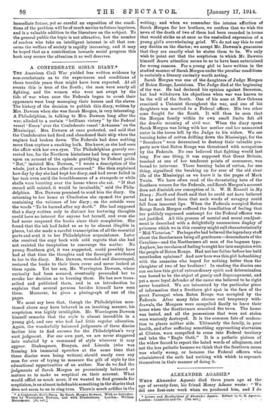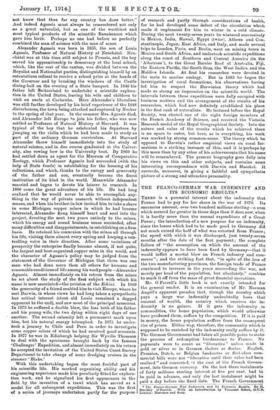ALEXANDER AGASSIZ.*
WHEN Alexander Agaesiz died three years ago at the age of seventy-four, his friend Henry Adams wrote: " We did one first-rate work when we produced him, and I do
• Letter. ond Earoilertioni of Alexander Agaaria• Edited by AL B. Allard.. London : Constable and Co. El4o. het] • .. -
pot know that thus far any country has done better?' And indeed Agasaiz must always be remembered not only as a great naturalist, but as one of the worthiest and most typical products of the scientific. Renaissance which gave him birth. Perhaps no one had before so perfectly combined the man of science with the man of sense.
Alexander Agassiz was born in 1835, the eon of Louis Agaesiz, Professor of Natural History at Neuchatel. Neu- chatel was at this time still subject to Prussia, and the boy served his apprenticeship to democracy at the local school, which, like the rest of the canton, was divided between the Royalist and Nationalist parties, distinguishing himself by an ostentatious refusal to receive a school prize at the hands of the Governor and by breaking the windows of the Castle dining-hall on the evening of a State banquet. In 1846 his father left Switzerland to undertake a scientific explora- tion in the United States, leaving his wife and children to visit an uncle at Carlsruhe. Here Alexander's liberalism was still further developed by his brief experience of the 1848 disturbances, the town being attacked and captured by Necker in the spring of that year. In the summer Mrs. Agaesiz died, and Alexander left Europe to join his father, who was now settled as Professor of Natural History at Harvard. It was typical of the boy that be celebrated his departure by jumping on the violin which he bad been made to study as part of the ordinary German curriculum. At Harvard Alexander threw himself immediately into the study of natural science, and in due course graduated at the Univer- sity, also rowing bow in the University boat. By 1860 he bad settled down as agent for the Museum of Comparative Zoology, which Professor Agaesiz had succeeded (with the help of State funds) in establishing for the, housing of his collections, and which, thanks to the energy and generosity of the father and eon, eventually became the finest institution of its kind in the world. Meanwhile Alexander married and began to devote his leisure to research. In 1866 came the great adventure of his life. He had long realized that he would never be able to accomplish any- thing in the way of private research without independent means, and when his brother-in-law invited him to take a share in some Michigan copper mines in which lie bad become interested, Alexander flung himself heart and soul into the project, devoting the next two years entirely to the mines, which his energy and sound business sense succeeded, after many difficulties and disappointments, in establishing on a firm basis. He retained his connexion with the mines all through his life, visiting them almost every spring and keeping a con- trolling voice in their direction. After some variations of Prosperity the enterprise finally became almost, if not quite, the largest and best-organized copper mine in the world, and the character of Agassiz's policy may be judged from the statement of the Governor of Michigan that there was one man who bad done more than all others for humane and seasonable conditionsof life among his workpeople—Alexander Agaesiz. Almost immediately on his return from the mince he set about the study of the first subject with which his name is now associated—the revision of the Echini. In 1869 the generosity of a friend enabled him to visit Europe, where he met Darwin, in whose views he had long taken a sympathetic but critical interest (stout old Louis remained a dogged opponent to the end), and saw most of the principal museums. In 1873 he suffered a double blow, the loss both of his father and his young wife, the two dying within eight days of one - another. The second calamity left a permanent mark upon him, but his natural energy triumphed. In 1875 he under- took a journey to Chile and Peru in order to investigate some copper mines of which he had received good accounts. In 1877 he was in Edinburgh helping Sir Wyville Thomson to deal with the specimens brought back by the famous `Challenger' Expedition, and almost immediately on his return he accepted the invitation of the United States Coast Survey Department to take charge of some dredging cruises in the steamer ' Blake.'
With this undertaking began the most fruitful part of his scientific) life. His marked organizing ability and his engineering experience made him peculiarly fitted for explora- tion work, and he signalized his first appearance in the field by the invention of a trawl which has served as a 'model for all subsequent expeditions, This was the first of a series of journeys undertaken partly for the purpose of research and partly through considerations of health, for he had developed some defect of the circulation which, made it unpleasant for him to winter in a cold climate. During the next twenty-seven years he wintered successively in Mexico, India, Hawaii, Egypt (twice), Athens and Cone etantinople, Japan, Eaat Africa, and Italy, and made several, trips to London, Paris, and Berlin, went on mining tours in Mexico and South Africa, and undertook scientific expeditions along the coast of Southern and Central America (in the ` Albatross '), to the Great Barrier Reef of Australia, Fiji, the Eastern Pacific, the South Seas, the West Indies, and the Maldive Islands. At first hie researches were devoted in the main to marine zoology. But in 1893 he began the investigation of coral formations, his observations having led him to suspect the Darwinian theory which had made so strong an impression on the scientific world. The intervals between these expeditions were fully occupied with business matters and the arrangement of the results of his researches, which had now definitely established his place in the first rank of naturalists. He lectured before the Royal Society, was elected one of the eight foreign members of the French Academy of Science, and received the Victoria Research medal of the Royal Geographical Society. Into the nature and value of the results which he achieved there is no space to enter, but here, as in everything, his work was marked by strong common-sense. The theory which he opposed to Darwin's rather empirical views on coral for, mations is a striking instance of this, and it is perhape by this more than by any other of his achievements that his name will be remembered. The present biography goes fully into his views on this and other subjects, and contains some interesting correspondence with Darwin and Haeokel. It succeeds, moreover, in giving a faithful and sympathetic picture of a strong and attractive personality.











































 Previous page
Previous page